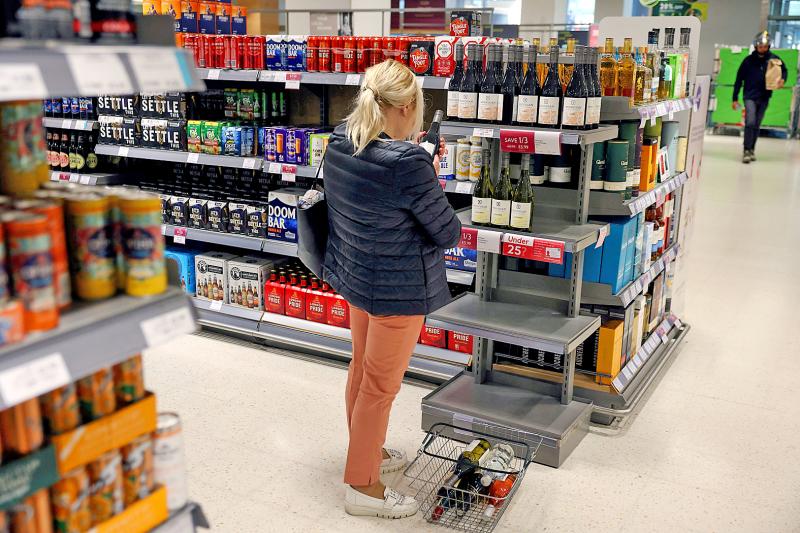UK retail sales fell last month as soaring food prices and the wider cost of living crisis forced consumer to cut back on spending.
The volume of goods sold in stores and online fell 0.5 percent from April, the Office for National Statistics (ONS) said yesterday.
Economists had expected a decline of 0.7 percent. Sales excluding auto fuel fell 0.7 percent.

Photo: Reuters
The drop — the third in the past four months — was driven by a 1.6 percent fall in food sales, particularly at large supermarkets, which the ONS linked to soaring prices.
Data earlier this week showed overall inflation hit a four-decade high of 9.1 percent last month.
“Feedback from supermarkets suggested customers were spending less on their food shop, because of the rising cost of living,” said Heather Bovill, ONS deputy director for surveys and economic indicators.
Figures earlier yesterday showed higher prices were also weighing heavy on consumer confidence, which dropped to a record low this month.
BLEAK JULY
The outlook for stores also looks bleak, with the Confederation of British Industry on Thursday saying that retailers were also expecting a poor July.
Taken together, the reports show the deep damage that the fastest inflation rate since the 1980s is having on the economy. With wages failing to keep pace with rising prices, consumer finances are being squeezed and leading to a more gloomy outlook than during the depths of the COVID-19 pandemic.
“Britain faces a stark new economic reality,” said Joe Staton, client strategy director at GfK. “History shows that consumers will not hesitate to retrench and tighten their purse strings when the going gets tough.”
The survey is the first since the government announced a multibillion-dollar package of support for households to help them cope with soaring energy bills and the latest drop suggests even that unprecedented aid is not enough to bolster sentiment.
RETAIL DRAG
Sales at supermarkets fell 1.5 percent last month, while sales of tobacco, alcohol and other drinks dropped 4 percent, the ONS said.
Total sales were 1.3 percent lower in the three months through May than during the December-to-February period, suggesting the retail sector would act as a drag on the economy in the second quarter.
Sales in April rose just 0.4 percent, rather than the 1.4 percent previously estimated.
Meanwhile, GfK yesterday said its measure of consumer sentiment dropped 1 point to minus-41 this month, the lowest reading in the 48 years of the survey.
The risk of recession weighed on consumers’ view of the future outlook both for their own finances and the broader economy.
The prospects of a summer of industrial action and soaring interest rates are also weighing heavily on the mood of the nation, with the Bank of England indicating it is prepared to sacrifice economic growth to lean against higher pices.
RECESSION?
With the economy already on track to shrink in the second quarter, the risk is that ebbing confidence weighs further on spending, delivering a recession later this year.
More pain also lies ahead, with the Bank of England predicting inflation would climb above 11 percent, more than five times its target, as more energy bill hikes kick in come October.

Shares in Taiwan closed at a new high yesterday, the first trading day of the new year, as contract chipmaker Taiwan Semiconductor Manufacturing Co (TSMC, 台積電) continued to break records amid an artificial intelligence (AI) boom, dealers said. The TAIEX closed up 386.21 points, or 1.33 percent, at 29,349.81, with turnover totaling NT$648.844 billion (US$20.65 billion). “Judging from a stronger Taiwan dollar against the US dollar, I think foreign institutional investors returned from the holidays and brought funds into the local market,” Concord Securities Co (康和證券) analyst Kerry Huang (黃志祺) said. “Foreign investors just rebuilt their positions with TSMC as their top target,

REVENUE PERFORMANCE: Cloud and network products, and electronic components saw strong increases, while smart consumer electronics and computing products fell Hon Hai Precision Industry Co (鴻海精密) yesterday posted 26.51 percent quarterly growth in revenue for last quarter to NT$2.6 trillion (US$82.44 billion), the strongest on record for the period and above expectations, but the company forecast a slight revenue dip this quarter due to seasonal factors. On an annual basis, revenue last quarter grew 22.07 percent, the company said. Analysts on average estimated about NT$2.4 trillion increase. Hon Hai, which assembles servers for Nvidia Corp and iPhones for Apple Inc, is expanding its capacity in the US, adding artificial intelligence (AI) server production in Wisconsin and Texas, where it operates established campuses. This

US President Donald Trump on Friday blocked US photonics firm HieFo Corp’s US$3 million acquisition of assets in New Jersey-based aerospace and defense specialist Emcore Corp, citing national security and China-related concerns. In an order released by the White House, Trump said HieFo was “controlled by a citizen of the People’s Republic of China” and that its 2024 acquisition of Emcore’s businesses led the US president to believe that it might “take action that threatens to impair the national security of the United States.” The order did not name the person or detail Trump’s concerns. “The Transaction is hereby prohibited,”

Garment maker Makalot Industrial Co (聚陽) yesterday reported lower-than-expected fourth-quarter revenue of NT$7.93 billion (US$251.44 million), down 9.48 percent from NT$8.76 billion a year earlier. On a quarterly basis, revenue fell 10.83 percent from NT$8.89 billion, company data showed. The figure was also lower than market expectations of NT$8.05 billion, according to data compiled by Yuanta Securities Investment and Consulting Co (元大投顧), which had projected NT$8.22 billion. Makalot’s revenue this quarter would likely increase by a mid-teens percentage as the industry is entering its high season, Yuanta said. Overall, Makalot’s revenue last year totaled NT$34.43 billion, down 3.08 percent from its record NT$35.52